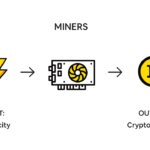
Bitcoin adoption is growing all over the world. And this sets people up to the whims of scammers who are ever devising ingenious ways to rid people of their hard-earned coins. Especially with the price of Bitcoin is on a very positive trajectory, presently almost crossing the $5,000 psychological line, even so for brief moment. So, this is a lucrative area for scammers. I have been thinking a lot about Bitcoin and Social Media, especially how it is a target for these reapers to acquire unsuspecting victims. Yes, as much as it has been on the radar of investors and entrepreneurs, the darkness must always rise, too.
A recent report by ZeroFox, a digital risk monitoring risk, highlighted this new breed of financial scam making rounds in the social networks. ZeroFox stated three categories of targets- mobile-gamers, holiday shoppers, and bank customers, not to mention Bitcoin owners. It’s decentralized, pseudo-anonymous, and irreversible nature gives Bitcoin its appeal to scammers. The social media demographic is one which can easily be pulled into the Bitcoin vision, coupled with the money-craze, gives a fertile ground for the scammers to come in. ZeroFox presented four ways in which these scams are taking place:
Bitcoin Phishing Impostors
I am no stranger to impersonation on social media, especially Facebook where it’s an epidemic. You have probably come across such impostors. So this is what happens when they impersonate Bitcoin brands. Preying on your trust and curiosity, they entice you with the website upon which they ask you to enter your private key ( by providing a search function) under the ruse that they need to confirm whether it’s in their database. Once you do that, your private key is phished and the perpetrator spends the bitcoins directly from your wallet. Your credulity is severely taxed. For instance, the Impostors use the trusted Bitcoin logo as their social media avatar. Along with click-bait statements to propagate the phishing URLs. In turn you are directed to the phishing webpage.
Bitcoin Ponzi Schemes
These are usually built on rather cultist foundations. They employ the usual tag and bag tactics of high-yield investment programs and multi-level marketing. Usually, the people caught in these schemes are never aware or find it hard to detect the nuances of malicious intent. The victims are encouraged to bring in other folks using referral links, from which they are rewarded. And soon enough, the ponzi gets big enough for the initiator to exit, collapsing it with a loud BANG. The crusade for recruiting people is done on social media, both for the scammer and victims, and I have witnessed this. You have probably watched YouTube videos to that effect.
But the thing that disturbs me are the cloud scams, specifically the fact that some of these are legitimate. Basically, with cloud mining, people group together to leverage pool mining. More often than not, big promises are made with little or no fulfilment. These entities often advertise on social media for their services. From questionable donations to outrageous returns, it appears that these schemes are yet to be a thing of the past.
Bitcoin-Flipping Schemes
These follow the customary process of money-flipping schemes carried out on bank customers. These scams take the angle of a victim being asked for Bitcoin as a startup fee to make the investment from which they can realize high returns within two shakes of a duck’s tail. You have guessed it right, the other person never fulfils their end of the bargain. It is a low-rise tactic for them, from which they benefit immensely when done on a large scale. Social media plays a huge role in this as they broadcast their calls to action.
Malware Downloads
ZeroFox noted a massive number of attacks in this regard. Usually the scammers post compromised URLs on social media where the victims click through. So what happens, the reapers use the promise of Bitcoin to nudge the victims through to eventually download an application that is riddled with malware (fake wallets); that’s one way. The other way is the use of Bitcoin surveys that are laden with malware. Caution should be taken on any shortened URL that you come across social media and ZeroFox also recommends that they should have a HTTPS connection.
According to ZeroFox, there were 3,618 Bitcoin scam URLs spread across social media. Within the perspective of history, these URLs have been shared 126, 276,549 within social media posts. However, there are other ways that the scamming takes place, like through a DM or a phone call, links in bios.
Social media has been weaponised, alongside other digital channels. You have to stay sharp out there, the reapers are lurking!











